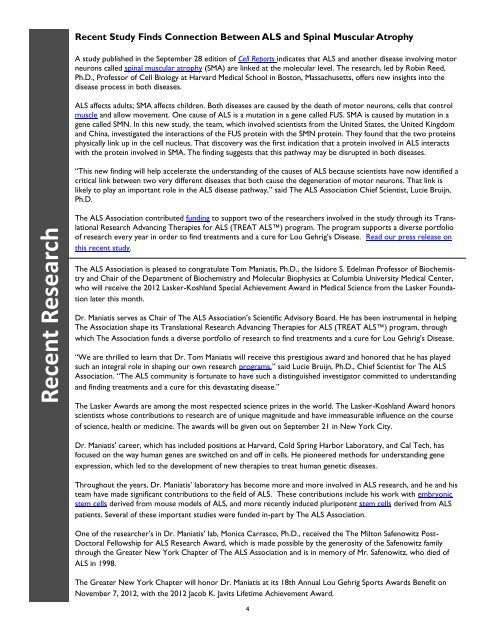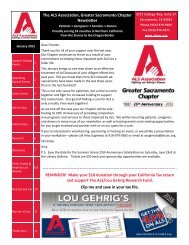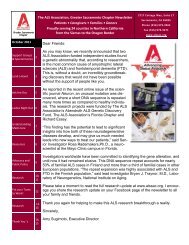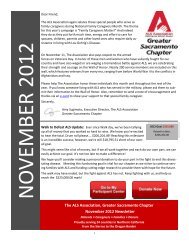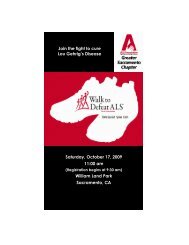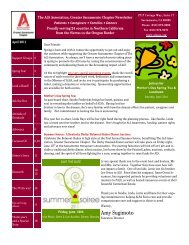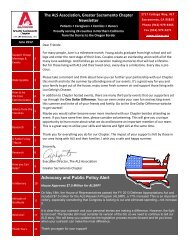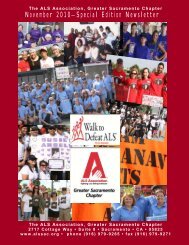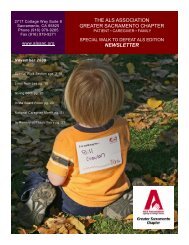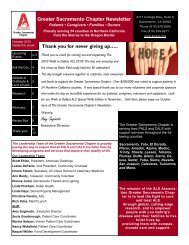October 2012 - The ALS Association Greater Sacramento
October 2012 - The ALS Association Greater Sacramento
October 2012 - The ALS Association Greater Sacramento
Create successful ePaper yourself
Turn your PDF publications into a flip-book with our unique Google optimized e-Paper software.
Recent Research<br />
Recent Study Finds Connection Between <strong>ALS</strong> and Spinal Muscular Atrophy<br />
A study published in the September 28 edition of Cell Reports indicates that <strong>ALS</strong> and another disease involving motor<br />
neurons called spinal muscular atrophy (SMA) are linked at the molecular level. <strong>The</strong> research, led by Robin Reed,<br />
Ph.D., Professor of Cell Biology at Harvard Medical School in Boston, Massachusetts, offers new insights into the<br />
disease process in both diseases.<br />
<strong>ALS</strong> affects adults; SMA affects children. Both diseases are caused by the death of motor neurons, cells that control<br />
muscle and allow movement. One cause of <strong>ALS</strong> is a mutation in a gene called FUS. SMA is caused by mutation in a<br />
gene called SMN. In this new study, the team, which involved scientists from the United States, the United Kingdom<br />
and China, investigated the interactions of the FUS protein with the SMN protein. <strong>The</strong>y found that the two proteins<br />
physically link up in the cell nucleus. That discovery was the first indication that a protein involved in <strong>ALS</strong> interacts<br />
with the protein involved in SMA. <strong>The</strong> finding suggests that this pathway may be disrupted in both diseases.<br />
“This new finding will help accelerate the understanding of the causes of <strong>ALS</strong> because scientists have now identified a<br />
critical link between two very different diseases that both cause the degeneration of motor neurons. That link is<br />
likely to play an important role in the <strong>ALS</strong> disease pathway,” said <strong>The</strong> <strong>ALS</strong> <strong>Association</strong> Chief Scientist, Lucie Bruijn,<br />
Ph.D.<br />
<strong>The</strong> <strong>ALS</strong> <strong>Association</strong> contributed funding to support two of the researchers involved in the study through its Translational<br />
Research Advancing <strong>The</strong>rapies for <strong>ALS</strong> (TREAT <strong>ALS</strong>) program. <strong>The</strong> program supports a diverse portfolio<br />
of research every year in order to find treatments and a cure for Lou Gehrig’s Disease. Read our press release on<br />
this recent study.<br />
<strong>The</strong> <strong>ALS</strong> <strong>Association</strong> is pleased to congratulate Tom Maniatis, Ph.D., the Isidore S. Edelman Professor of Biochemistry<br />
and Chair of the Department of Biochemistry and Molecular Biophysics at Columbia University Medical Center,<br />
who will receive the <strong>2012</strong> Lasker-Koshland Special Achievement Award in Medical Science from the Lasker Foundation<br />
later this month.<br />
Dr. Maniatis serves as Chair of <strong>The</strong> <strong>ALS</strong> <strong>Association</strong>’s Scientific Advisory Board. He has been instrumental in helping<br />
<strong>The</strong> <strong>Association</strong> shape its Translational Research Advancing <strong>The</strong>rapies for <strong>ALS</strong> (TREAT <strong>ALS</strong>) program, through<br />
which <strong>The</strong> <strong>Association</strong> funds a diverse portfolio of research to find treatments and a cure for Lou Gehrig’s Disease.<br />
“We are thrilled to learn that Dr. Tom Maniatis will receive this prestigious award and honored that he has played<br />
such an integral role in shaping our own research programs,” said Lucie Bruijn, Ph.D., Chief Scientist for <strong>The</strong> <strong>ALS</strong><br />
<strong>Association</strong>. “<strong>The</strong> <strong>ALS</strong> community is fortunate to have such a distinguished investigator committed to understanding<br />
and finding treatments and a cure for this devastating disease.”<br />
<strong>The</strong> Lasker Awards are among the most respected science prizes in the world. <strong>The</strong> Lasker-Koshland Award honors<br />
scientists whose contributions to research are of unique magnitude and have immeasurable influence on the course<br />
of science, health or medicine. <strong>The</strong> awards will be given out on September 21 in New York City.<br />
Dr. Maniatis' career, which has included positions at Harvard, Cold Spring Harbor Laboratory, and Cal Tech, has<br />
focused on the way human genes are switched on and off in cells. He pioneered methods for understanding gene<br />
expression, which led to the development of new therapies to treat human genetic diseases.<br />
Throughout the years, Dr. Maniatis’ laboratory has become more and more involved in <strong>ALS</strong> research, and he and his<br />
team have made significant contributions to the field of <strong>ALS</strong>. <strong>The</strong>se contributions include his work with embryonic<br />
stem cells derived from mouse models of <strong>ALS</strong>, and more recently induced pluripotent stem cells derived from <strong>ALS</strong><br />
patients. Several of these important studies were funded in-part by <strong>The</strong> <strong>ALS</strong> <strong>Association</strong>.<br />
One of the researcher’s in Dr. Maniatis’ lab, Monica Carrasco, Ph.D., received the <strong>The</strong> Milton Safenowitz Post-<br />
Doctoral Fellowship for <strong>ALS</strong> Research Award, which is made possible by the generosity of the Safenowitz family<br />
through the <strong>Greater</strong> New York Chapter of <strong>The</strong> <strong>ALS</strong> <strong>Association</strong> and is in memory of Mr. Safenowitz, who died of<br />
<strong>ALS</strong> in 1998.<br />
<strong>The</strong> <strong>Greater</strong> New York Chapter will honor Dr. Maniatis at its 18th Annual Lou Gehrig Sports Awards Benefit on<br />
November 7, <strong>2012</strong>, with the <strong>2012</strong> Jacob K. Javits Lifetime Achievement Award.<br />
4


